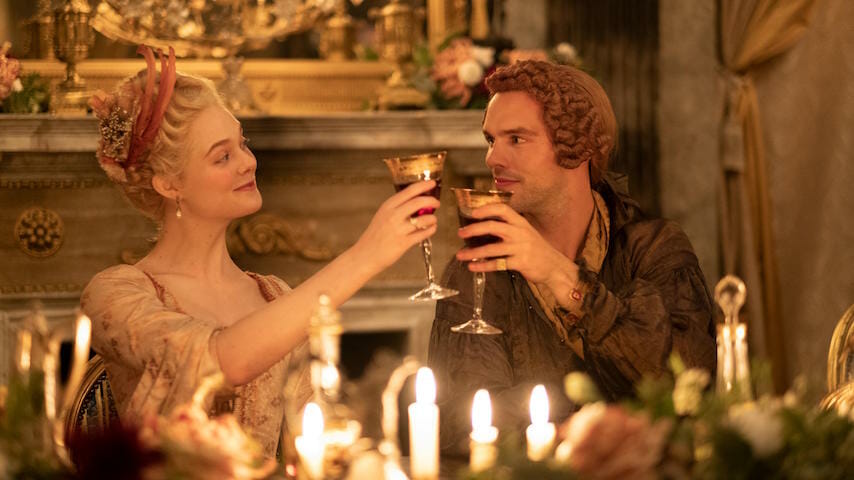The Great: A Wonderfully Bombastic Chronicle of Catherine’s Russian Rise
Huzzah!
Photo Courtesy of Hulu
This review originally published on May 1, 2020
For those who adored The Favourite, writer Tony McNamara is back with “an occasionally true story” for Hulu focused on the rise of Catherine the future great, when she was just “a 20-year-old who’s been in Russia six months, and who—with the aid of a drunken general, an angry maid, and a nervous bureaucrat—is going up against the violent regime that is Peter’s empire,” (as one character succinctly states). The 10-episode series has a crisp, fast-moving script and sumptuous costuming that looks like a traditional historical drama but feels refreshingly modern in its approach. Bathed in a Marie Antoinette meets Death of Stalin aesthetic (and never going Full Dickinson), the series’ acid, winning humor understands the familiar absurdity of an age filled with the constant juxtaposition of wealth and brutality. Emotionally affecting as a complicated dance of horror and hope, Catherine’s outright victories may be few and far between, but the journey is thrilling.
The Great begins in the mid-18th century, with Catherine’s (Elle Fanning) arrival at the Russian court as a naive German bride for Peter (Nicholas Hoult) the not-so-great and in fact very-much-awful. A script this cleverly bombastic requires very specific handling to balance its humor and drama, and both Hoult and Fanning are luminous as the ill-matched new couple. But though Catherine has a distaste (quite rightfully) for Peter, she does have a heart for her new country. “I want a strong, vibrant Russia alive with ideas, humane and progressive, where people live with dignity and purpose,” she says dreamily. “Russia?” the Emperor’s advisor Orlo (Sacha Dhawan) says in a questioning tone. “It needs to be believable.” Catherine’s maid, Marial (Phoebe Fox)—a former noble lady stripped of her position—adds, “Just tell them … no one will rape and kill you and your children, and you’ll have some bread. That would be sufficient.”
Serious issues of Russia’s ongoing war with Sweden, as well as the spread of smallpox and worrying matters of state, ground the otherwise truly bonkers events happening inside Peter’s Hieronymus Bosch-like court. Catherine wishes Russia to modernize and become more European, while Peter has a custard dessert served on platters next to severed heads whose eyes he gouges for fun. He also schtupps his best friend’s wife in front of him, constantly, and is irritated by Catherine’s apparent piety and lack of enjoyment in their own sexual encounters. “Mother always lit up when father came in a room. I could kill Catherine now and start again, why is no one excited by this?!” Peter whines. Later, contrite, he quickly rushes through a non-apology: “You probably don’t remember this, but a week ago I shot your bear and punched you. And I think that has caused a pall between us.”
Hoult’s line readings are masterful in their comedic derangement, reminiscent in some ways of Jodie Comer’s unique take on the character Villanelle in Killing Eve. Peter is a handsome psychopath, but he’s also sometimes tender and almost childlike. He punctuates every statement with “fuck off” or “huzzah,” breaking glasses, faces, and killing indiscriminately (he also throws a dog off the castle roof as a “science experiment” meant to appease Catherine, but thankfully the science part of it—a parachute—saves the day). But when Hoult’s Peter looks to Catherine for approval, there’s something unexpectedly likable about him. Not enough to let him off the hook, though. “You have given me a bear and have ceased punching me,” Catherine tells him dryly. “What woman would not be happy? Huzzah.”
-

-

-

-

-

-

-

-

-

-

-

-

-

-

-

-

-

-

-

-

-

-

-

-

-

-

-

-

-

-

-

-

-

-

-

-

-

-

-

-








































